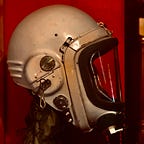The U.S. Military Is Turning to Science Fiction to Shape the Future of War
How the military is growing a cottage industry of sci-fi writer consultants to help it predict the nature of tomorrow’s conflicts
In 2030, a severe drought triggers a refugee crisis, which in turn sparks a war between two African nations. The UN steps in, deploying U.S. and French soldiers to keep the borders secure. An information warfare specialist is sent in when a disinformation campaign depicts U.S. forces destroying religious sites and infecting refugees with tainted vaccines and moves to help mitigate attacks from state actors looking to destabilize the region. Just as support for intervention in the conflict erodes in the United States, violence begins to rise, and the team is forced to work quickly to prevent the crisis from growing into a larger conflict.
It may sound like it could be the plot of a new Netflix series, but it’s actually one of the U.S. Army’s “science fiction prototypes,” a teaching tool designed to imagine what the near future of warfare might look like and to prompt military personnel to think creatively about conflicts they might end up fighting. This one takes the form of a 71-page graphic novel called Invisible Force: Information Warfare and the Future of Conflict, produced by…
